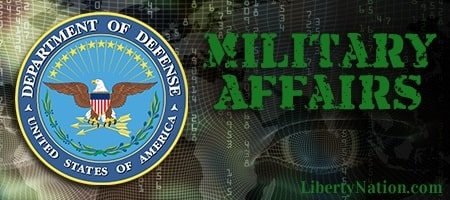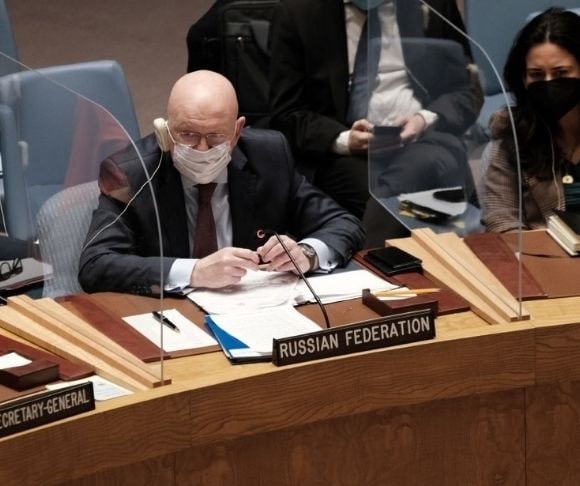At the request of the United States, on Jan. 31 the U.N. Security Council for the first time took up the issue of Russian troops threatening the sovereignty of Ukraine. President Joe Biden’s diplomats and Moscow’s team got off to a rocky start as Russia and China attempted to shut down the meeting.
Chen Xu, China’s U.N. representative to the august body, called for, as The Guardian noted, “quiet diplomacy” and not “microphone diplomacy.” So the Security Council took a vote, with ten calling for the meeting, two against, and three abstentions.
 The other vote against the session was cast, predictably, by Russia’s U.N. Ambassador Vasily Nebenzya. The United Kingdom, United States, Norway, Brazil, Albania, Ghana, UAE, France, Mexico, and Ireland all were in favor of continuing. Gabon, India, and Kenya were the abstainers. The repudiation of Moscow and Beijing’s attempts to avoid addressing the Kremlin’s 130,000 combat troops on Ukraine’s border was significant. Not only because it showed Russia and China as obstructionists but also the other nations wanted to get the problem out in a public forum.
The other vote against the session was cast, predictably, by Russia’s U.N. Ambassador Vasily Nebenzya. The United Kingdom, United States, Norway, Brazil, Albania, Ghana, UAE, France, Mexico, and Ireland all were in favor of continuing. Gabon, India, and Kenya were the abstainers. The repudiation of Moscow and Beijing’s attempts to avoid addressing the Kremlin’s 130,000 combat troops on Ukraine’s border was significant. Not only because it showed Russia and China as obstructionists but also the other nations wanted to get the problem out in a public forum.
The Guardian’s Julian Borger provided background on why the United States called the meeting for Jan. 31. That was the last day Norway held the Security Council’s president’s chair. On Feb. 1, Russia took over the Security Council presidency and most likely would not agree to a formal meeting to discuss the Ukraine crisis.
U.S. Ambassador Linda Thomas-Greenfield presented the U.S. position, explaining that the Biden administration believes Russia’s menacing of Ukraine “also threatens Europe.” She called Russia’s troop maneuvers on Ukraine’s border “aggressive behavior” and went on to say, “We seek peace. We seek the path of dialogue. We do not want confrontation. But we will be decisive, swift, and united should Russia further invade Ukraine.” Thomas-Greenfield implied since Moscow-backed separatists are in the eastern Donbas region of Ukraine, there is already an invasion.
She expanded the U.S. concern to include Russian exercises in Belarus, explaining there were 10,000 Russian soldiers in Belarus with “heavy armor” and 30,000 expected by the middle of February.
Nebenzya thanked China for its opposition to the meeting and reminded the Security Council that Moscow’s combat forces deployed on Ukraine’s border are “troops in our own territory,” so it is not an “act of aggression.” Using Kremlin talking points, he called the reaction to the Ukraine border crisis “hysterics.” Then, according to the Associated Press, the discourse turned nasty as Nebenzya accused the United States of bringing “‘pure Nazis’ to power in Kyiv.”
 Thomas-Greenfield did not let playing the Hitler card stand without returning fire. She “shot back that Russia’s growing military force of more than 100,000 troops along Ukraine’s borders was ‘the largest mobilization’ in Europe in decades, adding there has been a spike in cyberattacks and Russian disinformation.” The U.S. ambassador told the Security Council “they are attempting, without any factual basis, to paint Ukraine and Western countries as the aggressors to fabricate a pretext for attack.”
Thomas-Greenfield did not let playing the Hitler card stand without returning fire. She “shot back that Russia’s growing military force of more than 100,000 troops along Ukraine’s borders was ‘the largest mobilization’ in Europe in decades, adding there has been a spike in cyberattacks and Russian disinformation.” The U.S. ambassador told the Security Council “they are attempting, without any factual basis, to paint Ukraine and Western countries as the aggressors to fabricate a pretext for attack.”
The Kremlin’s message to the United States, its allies, and the rest of the world was summed up by Nebenzya’s closing remarks. He treated derisively any suggestion of Russia threatening Ukraine and warned that any attempt to break the Minsk Agreement establishing a cease-fire in eastern Ukraine “might end in the absolute worst way for Ukraine.” Nebenzya failed to mention that Russian-backed separatists have routinely broken the cease-fire. One of the machine-gun and rocket-propelled grenade exchanges took place while Biden and Russian President Vladimir Putin were on a secure video call discussing how to de-escalate tensions on Ukraine’s border.
The Security Council will not take any formal action considering the Kremlin’s veto power and that Russia will be presiding over the council for February. Besides getting the Security Council members on record, the charges and countercharges didn’t do much to resolve the Ukraine border crisis.
The views expressed are those of the author and not of any other affiliation.
~ Read more from Dave Patterson.




